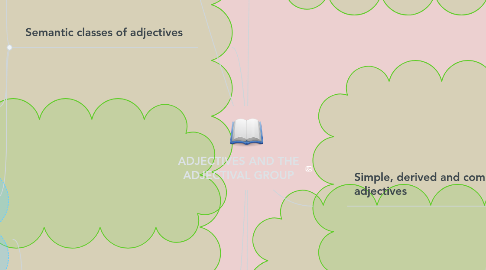
1. Participles and participial adjectives
1.1. Participial adjectives seldom used in VGs
1.2. Participial adjectives commonly used as Verbal Groups
1.3. Pseudo-participial adjectives
1.4. Participial modifiers
1.5. Compound forms
2. Semantic classes of adjectives
2.1. Descriptors
2.1.1. size, weight, extent: thick-thin, high-low, wide-narrow, deep-shallow, young-old.
2.1.2. colour: blue, brown, grey, yellow, purple,etc
2.1.3. shape: round, square, oval,etc
2.1.4. meanings related to time: new, recent,etc
2.1.5. evaluative: awesome (AmE), pretty,etc
2.1.6. an active or passive process: puzzling, surprising,etc
2.1.7. general qualities: warm-cool, full-empty,etc
2.1.8. a temporary state: alight, alone,etc
2.2. Classifiers
2.2.1. restrictive: they restrict the referent of a noun in relation to another referent: average, additional, chief,etc
2.2.2. relating to groups such as nationalities, religions, politics: Brazilian, Christian,etc
2.2.3. category-specific meanings associated with culture, technology, science, and so on: heavy industry, light aircraft,etc
2.3. Degree emphasiers
2.3.1. In addition to these two main types, certain adjectives can function as degree emphasisers with a strongly emotive tinge: sheer nonsense; mere repetition;etc
3. Syntactic functions of the adjectival group
3.1. AdjGs in groups
3.1.1. (pre-)modifier in a NG: a very good actor, heavy rain, an old friend
3.1.2. (post-)modifier in a NG something cheap, the person responsible
3.1.3. head of a NG: the French, the sick, the most expensive
3.1.4. complement of a preposition: at last, for good, in short
3.1.5. modifier in an AdjG: bright red, pale blue, red hot
3.2. AdjGs in clauses
3.2.1. Subject Complement: The acting was brilliant.
3.2.2. Object Complement: I consider that offensive.
3.3. Peripheral AdjGs
3.3.1. Stance Adjunct: Strange, I never suspected him.
3.3.2. Detached predicative supplement: Angry and tearful, Susan walked out.
3.3.3. Exclamation: Fine! Great! Right! Fantastic!
4. Structure and characteristic uses of the adjectival group
4.1. Structure
4.1.1. a head (h)
4.1.2. a modifier(m)
4.1.3. a post-head element
4.2. Charateristic
5. Simple, derived and compound adjectives
5.1. The most frequently used adjectives in English are monosyllabic or disyllabic words of native origin
5.2. Most adjectival prefixes are added to words which are already adjectives
5.3. Adjectives in English are invariable in form.
6. Central and peripheral adjectives
6.1. Central adjectives: descriptors
6.2. Predicative adjs only: afraid, asleep, ablaze, adrift, alive, alone, alike, aware, averse
6.3. Attributive adjs only:
6.3.1. restrictive classifiers: the chief/main reason; sole responsibility; an only child
6.3.2. time/space: the previous page; my old school; a new baby; your left leg
6.3.3. associative classifiers: an agricultural college, foreign affairs, a nuclear weapon
6.3.4. degree emphasisers: sheer nonsense; utter rubbish; an outright lie
6.3.5. process-oriented: a big eater; a hard worker, a light sleeper, a slow reader
